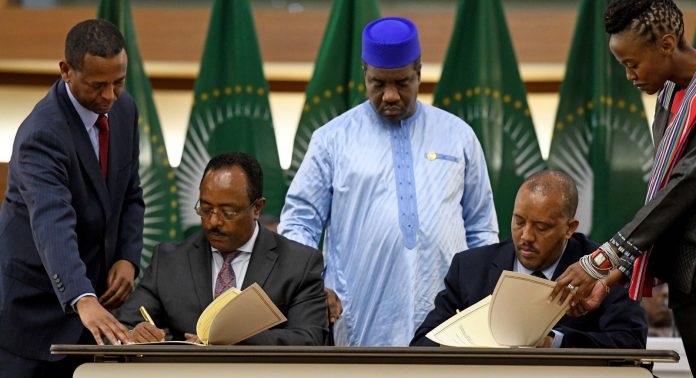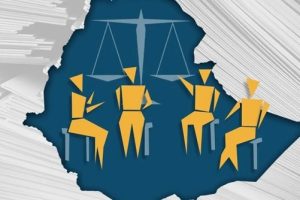
Over two and a half years since its signing, the Pretoria Peace Accord, which ended the devastating conflict in northern Ethiopia, continues to hold a peace. While significant progress has been made in silencing the guns and restoring some essential services, the full implementation of the November 2, 2022 agreement faces persistent challenges due to some Tigray People’s Liberation Front (TPLF) faction, raising concerns about the long-term stability of the region.
The accord, brokered by the African Union (AU) between the Government of Ethiopia (FDRE) and the TPLF, brought an end to a brutal two-year conflict. Its initial success in achieving a cessation of hostilities was widely lauded as an “African solution to African problems.”
Indeed, the immediate aftermath saw the gradual return of telecommunications, banking, and humanitarian aid to Tigray, which had been largely cut off during the conflict. The disarmament, demobilization, and reintegration (DDR) program for TPLF combatants has also commenced, a crucial step towards normalizing the region.
Prime Minister Abiy Ahmed (PhD), in a wide-ranging televised interview with EBC, described the Pretoria Peace Accord as a historic breakthrough, noting that Ethiopia has rarely succeeded in ending internal conflicts peacefully before.
Abiy (PhD) has hailed the Pretoria Peace Accord as a historic turning point in Ethiopia’s long struggle with internal conflict, emphasizing that it marks one of the few instances in the country’s history where peace was achieved through dialogue rather than force.
The Prime Minister reflected on Ethiopia’s entrenched political culture, which for decades has been dominated by the pursuit of power through armed struggle.
He detailed Ethiopia’s political culture, often shaped by force and the barrel of the gun to seize power for decades, and highlighted an unwarranted thirst for power and refusal to accept peaceful democratic competition as root causes of deep-seated resentment and distrust.
Against this historical backdrop, Prime Minister Abiy stated that his administration demonstrated a historic step in resolving Ethiopia’s internal conflicts through the Pretoria peace deal. He underlined that the accord marks an unprecedented approach, recalling the government’s exceptional decision to prioritize peace through the agreement, even while securing a swift military victory in Tigray. “It underscores the historical significance of choosing dialogue over winning the conflict militarily, marking a rare moment where power was exercised with restraint. The message is clear: true victory lies not just in winning wars, but in securing lasting peace,” PM Abiy asserted.
He further explained that conflicts in Ethiopia primarily arise from misguided political elites seeking to achieve goals through force and urged them to pursue peaceful means rather than imposing their will. He emphasized that armed struggle is outdated and genuine peace efforts like the National Dialogue Commission and the Pretoria Peace Agreement are testament to the government’s commitment to lasting peace through dialogue, adding that political power must come from popular legitimacy and democratic participation.
He pointed out that a persistent thirst for power and a refusal to embrace peaceful democratic competition have fueled deep divisions and enduring mistrust among political actors.
“Historically, Ethiopia has rarely resolved its internal conflicts through negotiation,” Abiy said. “The Pretoria Accord breaks that pattern and stands as a landmark in our national journey toward peace.”
The Prime Minister underscored that the decision to pursue peace through the Pretoria agreement came at a time when government forces were gaining rapid military ground in the Tigray region. Opting for negotiations, he said, demonstrated the government’s principled commitment to sustainable peace over military triumph.
“It was a conscious and historic choice to restrain the use of force, even when victory was within reach,” he said. “It shows that true victory lies not in defeating opponents, but in building a peaceful future together.”
Abiy further explained that many of Ethiopia’s conflicts stem from the actions of political elites who seek to impose their will through violence and divisive rhetoric, rather than relying on democratic processes.
He argued that peace and democracy will remain elusive unless political actors accept that power must be attained through free and fair elections and the consent of the people.
However, TPLF has come under renewed scrutiny for its reluctance to fully implement the terms of the Pretoria peace agreement signed in November 2022. The deal, brokered to end the brutal two-year conflict between the Ethiopian federal government and the TPLF, aimed to bring lasting peace to the war-torn Tigray region. While initial steps were taken, including a cessation of hostilities and partial disarmament, the TPLF’s ongoing failure to comply with key provisions has raised concerns both domestically and internationally.
A central issue is the TPLF’s hesitance to fully disarm its remaining combatants. Despite deadlines stipulated in the agreement, multiple reports suggest that significant portions of TPLF forces remain operational and continue to maintain parallel structures of authority. Additionally, there has been resistance to the full reintegration of federal institutions into Tigray, undermining the spirit of national unity the agreement sought to restore.
In an interview with the Ethiopian News Agency (ENA), U.S. Ambassador to Ethiopia Ervin Massinga praised the agreement for its effectiveness in silencing the guns in the Tigray region. “Let’s start with applauding the Pretoria agreement, which brought silence to the guns in that terrible war and restarted services to Tigray,” the ambassador stated.
Ambassador Massinga has made frequent visits to Tigray, assessing the progress of the implementation firsthand. While acknowledging the positive strides made, he emphasized the need to implement disarmament and address the situation of displaced people, who continue to endure hardships. “Finding ways to urgently reinvigorate the cessation of hostilities agreement and the element of allowing people to go home, along with disarmament and reintegration and the other elements of the Cessation of Hostilities Agreement (CoHA), is incredibly important,” he stressed. He reaffirmed that all parties involved clearly understand the U.S. position, which is to move forward, not backward, in the pursuit of lasting peace and stability.
The African Union continues to monitor the implementation of the accord through its Monitoring, Verification, and Compliance Mission (MVCM) and Joint Committee. AU officials have emphasized the importance of upholding commitments and facilitating ongoing dialogue. While the guns have largely fallen silent, the enduring challenges in implementing the Pretoria Peace Accord underscore the complex and protracted nature of post-conflict recovery. For a truly lasting peace to take root in Ethiopia, a concerted effort from all parties, supported by continued international engagement and a renewed commitment to the spirit of the agreement, will be paramount.
BY EYUEL KIFLU
THE ETHIOPIAN HERALD WEDNESDAY 11 JUNE 2025



